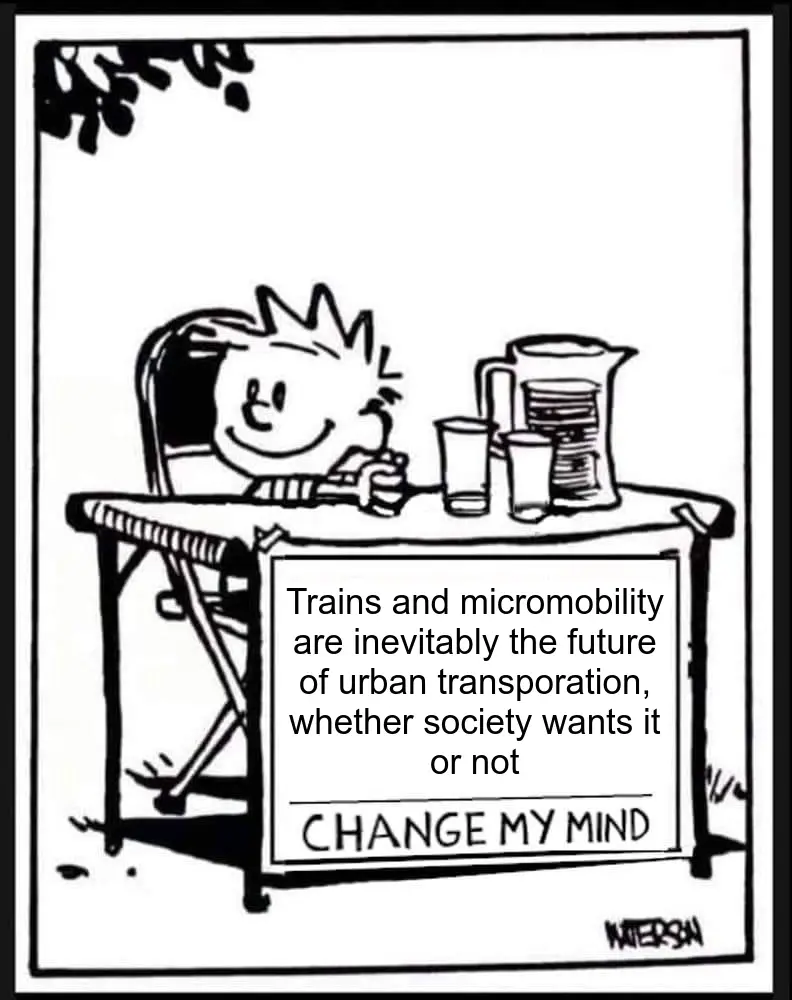Fuck Cars
A place to discuss problems of car centric infrastructure or how it hurts us all. Let's explore the bad world of Cars!
Rules
1. Be Civil
You may not agree on ideas, but please do not be needlessly rude or insulting to other people in this community.
2. No hate speech
Don't discriminate or disparage people on the basis of sex, gender, race, ethnicity, nationality, religion, or sexuality.
3. Don't harass people
Don't follow people you disagree with into multiple threads or into PMs to insult, disparage, or otherwise attack them. And certainly don't doxx any non-public figures.
4. Stay on topic
This community is about cars, their externalities in society, car-dependency, and solutions to these.
5. No reposts
Do not repost content that has already been posted in this community.
Moderator discretion will be used to judge reports with regard to the above rules.
Posting Guidelines
In the absence of a flair system on lemmy yet, let’s try to make it easier to scan through posts by type in here by using tags:
- [meta] for discussions/suggestions about this community itself
- [article] for news articles
- [blog] for any blog-style content
- [video] for video resources
- [academic] for academic studies and sources
- [discussion] for text post questions, rants, and/or discussions
- [meme] for memes
- [image] for any non-meme images
- [misc] for anything that doesn’t fall cleanly into any of the other categories
Recommended communities:
view the rest of the comments

There's an argument to be made that driverless cars make more efficient use of our existing infrastructure, namely, roads, and are more adapted to the hellscape of sprawl that we created. Traffic jams could effectively be eliminated if you get rid of people that treat the left lane like a regular traffic lane, people going too slow, people going too fast, etc. It's not like building more trains is going to suddenly mean that trains are convenient - there is a VAST amount of sprawl, and it's not going anywhere. It took the steel industry shutting down in Pittsburgh, and 60% of the population relocating, before people got the bright idea that actually living closer in to the population center makes sense and turn small outliers into ghost towns. I'm not against trains, I just think the scale of the problem is larger than most people understand when they say "build more trains."
The best long term solution for both nicer cities, happier people, and less environmental damage is to overhaul our infrastructure. Don't build trains in car dependant cities, make the car dependant cities walkable with public transportation that will leave you within a few minutes of your destination. The real reason self driving cars are the "future" is because selling cars has a higher profit margin than train/bus tickets.
Buses. It's almost driverless car with 1/80th of driver per ~~driver~~ passanger. Also it's 1/80 of car per car equivalent.
Not a foregone conclusion, at all. The average car occupancy now is something like 1.2 people, and self-driving cars might drop that below 1. Time behind the wheel is a cost that people pay for mobility, among other costs, and the Jevons Paradox says that if you make a commodity cost less per unit (i.e. more efficient) we end up using more of it in total, e.g. coal, or lighting. We could have more traffic as people send their empty cars on errands, for example. To get the benefits, you’d have to ban private car ownership. That seems like a heavy political lift, considering that they don’t even expect half of the U.S. private auto fleet to be electric before 2050, and those are available for sale right now.
The bit of the puzzle you are forgetting is the taxpayer-subsidized roads lose half their lobbying funds when electric cars are a thing. Wihtout trillions being spent sabotaging transit and micromobility it starts looking a lot better for cities to buipd a bike path for $1 million thna a highway upgrade for $1 billion